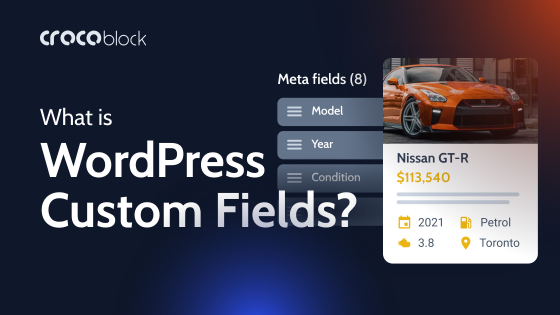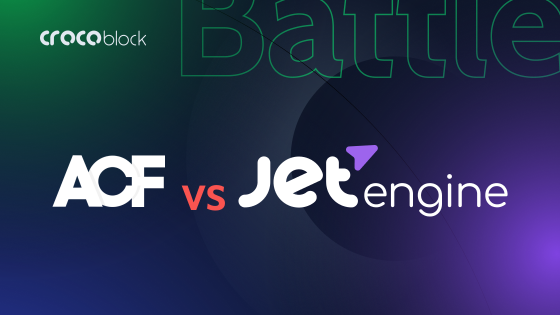Are you looking for a way to add custom fields or create custom post types? Let’s take a closer look at one of the earliest and most well-known solutions for this task — Advanced Custom Fields (ACF).
ACF was launched 14 years ago and quickly gained popularity because it simplified the process of adding custom fields to posts. It allowed developers to avoid writing extensive custom code, making it a developer-friendly tool. Although some coding was still necessary until recently, the plugin has steadily evolved.
In 2023, ACF expanded its functionality by adding the long-awaited functionality for creating custom post types and taxonomies, which had been a frequent request from its users.
The plugin is owned by WPEngine, which acquired it from Delicious Brains in June 2022. So, let’s examine what ACF does and how you may use it.
Table of Contents
- ACF WordPress Plugin Capabilities
- How to Get Started with ACF?
- Alternatives to ACF Functionality
- FAQ
- Final Words
ACF WordPress Plugin Capabilities
ACF is a flexible plugin that allows WordPress to offer a high level of customization. It will enable you to add custom fields to posts, pages, and custom post types, providing the possibility to organize and display dynamic content. Here are some of the plugin’s features:
1. Custom field types
Advanced Custom Fields plugin offers over 30 different field types to help you customize your content. These include basic options like text fields and checkboxes, as well as more advanced field types like Google Maps and file upload options.
There are also a few quite specific fields, e.g., for connecting related objects, taxonomies, or other posts by selecting them from the list.
2. Repeater field
The Repeater Field is one of ACF’s most popular features in the PRO package. It allows you to create a group of subfields that can be repeated multiple times. This is useful for scenarios where you need to add a set of fields repeatedly, such as creating a list of team members, product features, or steps in a process.
For example, on a recipe site, you could have a repeater field for ingredients where each ingredient’s name, amount, and measurement unit could be added separately. Each entry would be displayed in a structured and consistent way.
3. Flexible Content field
The Flexible Content field is another PRO field. It lets you create and manage blocks on the back end using customizable layouts and subfields so the page editor looks more organized.
To fetch the content on the front end, you can loop through every subfield.
4. Conditional logic
ACF allows you to set up conditional logic to display or hide fields based on the values of other fields. This feature enables a dynamic and user-friendly interface by showing only the fields that are relevant to the user’s previous selections. For example, if a user selects a “Yes” option for a question, additional fields may appear to gather more information.
5. Custom post types and taxonomies
ACF lets you extend WordPress by creating Custom Post Types (CPTs) and taxonomies. With ACF, you can:
- Create a new post type (e.g., “Products,” “Reviews,” “Testimonials”) and assign custom fields to it.
- Create custom taxonomies to group and organize content in meaningful ways.
- Use ACF’s custom post type features to write code for single post templates with your custom post types.
6. ACF Blocks for Block Editor
With the Advanced Custom Fields PRO plugin, you can create custom Gutenberg blocks. This integration with the WordPress Block Editor allows you to build content blocks that users can insert directly into posts or pages via the Block Editor interface.
These blocks are fully customizable, making it easier for you to create reusable content elements like call-to-action buttons, testimonials, and more. ACF Blocks offer a smooth editing experience and give developers complete control over the layout and design of each block.
7. Options pages
For PRO users, ACF allows the creation of Options pages where you can manage global settings for your website. For example, you can create a settings page to control your site’s social media links, sitewide branding, footer information, or any other global settings that apply across the site. This makes managing your website’s settings more organized and efficient.
8. ACF Relationship fields
The Relationship Field is a tool for linking posts and content dynamically across your site. You can link posts from different post types, allowing you to build relationships between your content. For example, if you have a custom post type for events and another for speakers, you can use the Relationship Field to link each event to its relevant speakers.
This feature is particularly useful for creating dynamic listings, related content sections, or structured data relationships on your website.
9. ACF form integration
With ACF, you can also create simple front-end forms to collect data from users. These forms can be linked to your custom post types or taxonomies, making it easy for users to submit content without needing access to the backend.
For example, you could create a user submission form for blog posts or testimonials, where users can fill in custom fields directly on the front end of your site.
10. Clone field
This feature allows you to clone other fields or field groups, making it easier to reuse field configurations.
How to Get Started with ACF?
Working with ACF is very easy. First, install the plugin on your site and activate it.
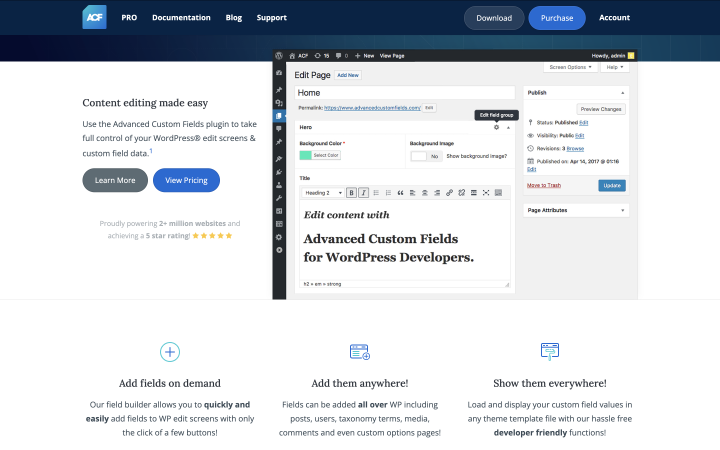
Go to the Dashboard and choose Field Groups.
- Click “Add New.”
- Create a name for your group of custom fields and write a title in the corresponding field.
- Click “Add Field” and select the field type.
- Set all necessary settings, such as field visibility, instructions, title, etc.
- Go to Settings and select a post type this group will be attached to. You can add multiple rules.
- Click “Save Changes.”
Ready. You can now use the configured ACF fields to add content.
If you want to add a new custom post type:
- Click on the Post Types tab.
- Name your post type and select a label for it.
- Apply a taxonomy to the created post type, if needed.
- Go to the Advanced Settings section and add permissions, labels, and other elements.
- Save the created custom post type and use it.
Alternatives to ACF Functionality
Are there alternatives to ACF? Of course.
You can create custom fields or custom post types with code. However, this method is not always convenient. If you need to add various tools, prefer to avoid coding, and want to save time, there are a few alternatives to the ACF plugin with similar or even more powerful functionality. Let’s analyze some of them.
JetEngine

Developer: Crocoblock
JetEngine is a plugin that helps to create:
- Custom Post Types;
- custom fields;
- taxonomies;
- Custom Content Types – to create custom databases and optimize data storage;
- advanced Relations (one-to-one, one-to-many, many-to-many, hierarchical);
- Option Pages;
- Query Builder – to create any query to fetch any posts and fields without coding (the unique feature);
- Profile Builder – to create custom user profiles and use advanced login to use content entities.
To do this, it has all the necessary functionality that is often lacking in analogs. Among these are the following:
- Dynamic Functions;
- Listing templates;
- ability to create user profiles that can be managed from the front end;
- Glossary;
- data visualization tools (dynamic tables, charts, etc.).
JetEngine holds a massive number of tools you can apply to help create a site exactly the way you envisioned.
The plugin manages static and dynamic elements, allowing you to establish relations between entries and collect all parameters and data in one place.
Toolset
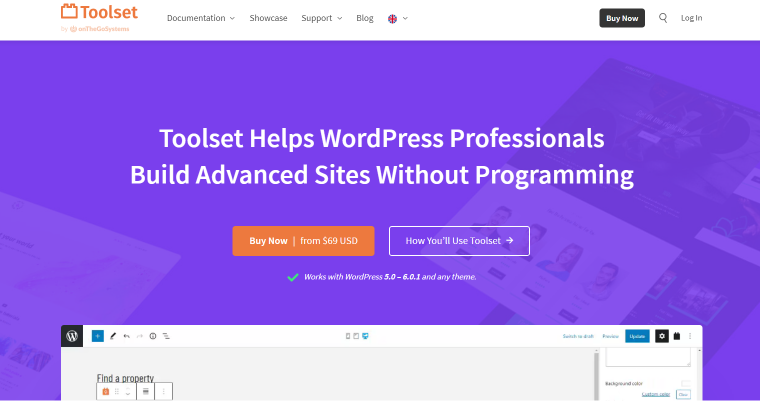
Developer: OnTheGoSystems
Toolset is another popular plugin for creating custom post types and fields. In addition, in the arsenal of its features, you will find the possibility of creating:
- templates, archives, and content lists;
- site search;
- record links;
- catalogs and WooCommerce pages;
- taxonomies;
- a Template Builder for the front end.
Note that you will not find Datetime, Textarea, or Switcher, which are present in ACF or JetEngine, among the list of custom fields.
MetaBox
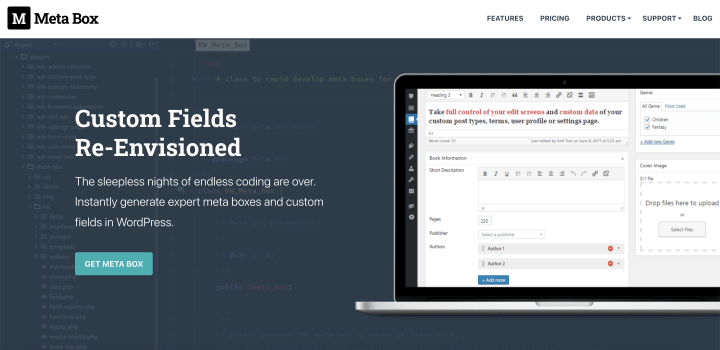
Developer: MetaBox.io
MetaBox is another ACF alternative. Web developers love it, but it isn’t easy for the average user.
MetaBox is a plugin that helps to create:
- Custom Post Types;
- custom meta fields (46 field types available);
- templates and display them on the front end using MB Views;
- custom database tables for meta fields using MB Custom Table (improves performance for large data sets);
- global settings pages using MB Settings Page (with customizer integration);
- Block Editor custom blocks using MB Blocks (minimal coding required);
- repeaters using MB Group;
- custom user profiles using MB User Profile;
- front-end post submissions using MB Frontend Submission;
- advanced relationships (posts, custom fields, and REST API integration);
- conditional logic to show/hide fields based on values (with fine-tuning operators).
It provides a rich interface with flexible settings and requires minimal coding, covering a wide range of customization needs.
Users find that MetaBox is highly flexible because its open-source nature allows changing its functions to suit your needs.
FAQ
After activating the plugin, you can add CPTs, taxonomies, custom fields, and even relations.
It extends the default WordPress functionality and helps to create custom fields, custom post types, and taxonomies. With ACF, you can take full control of the content and website design.
After activating the plugin, you can add CPTs, taxonomies, custom fields, and even relations. number of sites, it’s $249/year.
ACF advantages:
– It’s very simple to create custom fields, taxonomies, and Custom Post Types.
– ACF has a lot of free features.
ACF disadvantages:
– The plugin has changed ownership twice.
– It’s rather pricey.
– It still requires good coding skills.
Final Words
ACF is a great helper if you need additional fields for the content. It dramatically extends the features of WordPress and makes your work easier. Its second useful feature is creating custom post types and custom taxonomies, which helps to take complete control of the website content.
In this article, I described its main tools and features and also provided a couple of alternatives that offer similar or more extensive functionality.
